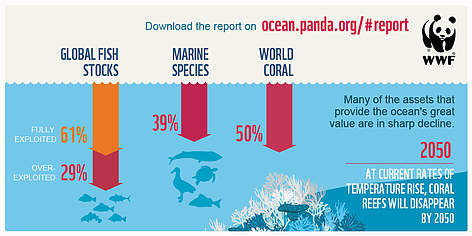Ecosystem Threats: Abusing our Oceans
- Mez

- Apr 5, 2021
- 4 min read

Reducing plastic use is making progress! Unfortunate there's other balance in attempt to make that work. I've stopped getting free plastic shopping bags from the supermarket some time ago but then had to go buy more garbage bags. I had relied on them and I cant say I have come across biodegradable to replace my need (blah blah blah) but society is already better aware about the long life of plastics, the Great Pacific Garbage Patch and what kind of garbage is ending up in the ocean, or landfill. We are seeing more social media posts about disposable coffee cups and recycling not actually being recycled "here". We know about dying reefs. We know lots more and there is good change but do we get enough depth of the issue? I can't help but wonder if we do or CAN and if society has enough structure to support making better choices.. or at least to remember what they are.
"Seaspiracy" reminds me, among many things of how much our civilization of this world lacks the actioned response to known issues to what the massive impacts our daily lives are making upon the oceans. There is sometime a sense of hopelessness or at least maybe an effort to take responsibility to reduce our own footprint (which is good but personal responsibility) but it is only a start and not enough to combat the massive abuse we have already monetised. Its not that any individual I know would deliberately do damage to the earth on this scale. I would assume a personality like that would be not only uncommon but quite rare. It's rather that the issue is so large that it is global and that this is why such isolated efforts to change (local or individual) are a good intent but fail miserably to make the difference that is actually required to turn the issue around.

The Oceans of our earth total an estimate of about 72% of our planet surface, an abundance so large that we can only even estimate the number of species living by our shores, a number that varies so much it is estimated to be between 178000-10m. However the dangerous decline in Marine Biodiversity highlights overfishing as the most significant threat to marine population and ecosystems. Whilst the increase in "sustainable fishing" practices and certified labels on products is a strategy "Seaspiracy" questions if they are actually helping or if there is such thing as sustainable fishing at all. So what do we do when in chains and you can make a good choice here but there are laws allowing mass destruction that global practice has so far failed to repair. It seems that laws have not led to not replacing practices with something that was enough in itself or looking at if that is even possible while we fish the oceans at the scale that we do. If my dad was here I think the issue itself would be enough to make him stressed. Average guy cannot fish the ocean and local areas did not permit that, yet just beyond the zones industry was allowed to take from the sea on a massive scale then sell it to us.
Pretty big isn't it? Among other things to consider, like everything else society prepares for us to have, in a structure where even we are limited to our options. You can avoid one ethical issue but sometimes only to run into another, like badly needing to do a tip run or replace all your old mattresses and if you don't I guess there's all kinds of health or scungy issues that comes with that. It's not that we can ever win on a positive choice but our options could certainly be better with enough technology and product advancement. It might not be about mattresses but how much plastic and unusable items do we eventuate to our lives. We rely on the options that we have and to be able to financially and physically access total change and that the world around us makes that possible for us, within reason. Our societies, together have driven us this way. It feels like we live our lives in chains. Societies must take the change together by our laws, practice productions so as individuals we are better enabled to take part in responsibilities.
To note, "Seaspiracy" had been under fire for it's documentary due to not supporting the sustainable fishing industry and their interviewing style. Clipped scenes of unexpected encounters do not fairly represent the views of those approached and are with a narrative to help you get what kind of heartless sense can be supposed across all involved (where change is needed). It can be argued that these inclusions can be distracting enough to lead others to miss the point of the documentary, or limit an ability for a viewer to absorb the right message. However, if you haven't seen it maybe you should still consider watching for the other content. It is packed with a tonne of other relevant information. The passionate angle that the documentary comes from still shows the sense of the underlying concerns. The message is still there and a better awareness of the large issue can lead certainly to further understanding, or self research on issues. Perhaps leading to change somewhere, however large or small but better than no change at all. 50% of our earth species could be extinct during the time that we are alive, if not, by at least the end of the century. That's certainly for our thoughts...
Better go. see you again.
-Mez

Comments